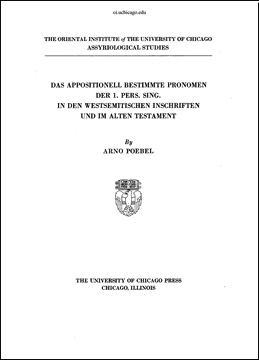AS 3. Das appositionell bestimmte Pronomen der 1. Pers. sing. in den westsemitischen Inschriften und im Alten Testament Arnold Poebel

In Hebrew, a personal pronoun in its absolute form, placed after and sometimes even before a suffixed pronoun of the same person, has the effect of emphasizing the latter. Dr. Poebel argues that in a great many cases of an absolute personal pronoun being followed by a nominal qualification — traditionally taken to form a nominal sentence — the nominal qualification is in reality an apposition to the preceding absolute personal pronoun. [From a review by O. E. Ravn in Ex Actorum Orientalium X (1932) 380–81]
- Assyriological Studies 3
- Chicago: University of Chicago Press, 1932
- Pp. viii + 86
- Paperback 7.00 x 9.50 in
- Out of Print

